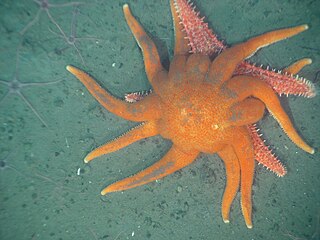
The Valvatida are an order of starfish in the class Asteroidea, which contains 695 species in 172 genera in 17 families.

The Echinasteridae are a family of starfish in the monotypic order Spinulosida. The family includes eight genera and about 133 species found on the seabed in various habitats around the world.

The Asterinidae are a large family of sea stars in the order Valvatida.
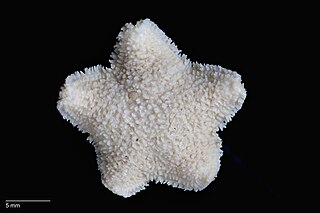
Patiriella is a genus of sea stars of the family Asterinidae. Many species formerly included in this genus have been transferred to other genera. They are commonly known as carpet sea stars.
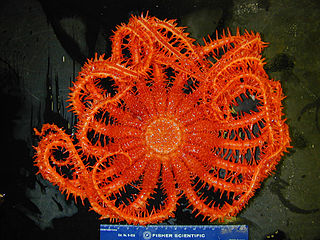
The Brisingids are deep-sea-dwelling starfish in the order Brisingida.

Odontohenricia is a genus of starfish in the family Echinasteridae.
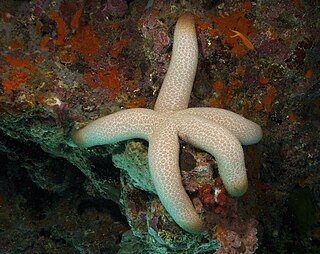
The Mithrodiidae is a family of starfish in the order Valvatida.

Thromidia is a genus of starfish in the family Mithrodiidae.

Certonardoa semiregularis is a species of sea star in the family Ophidiasteridae. It is the only species in the genus Certonardoa.
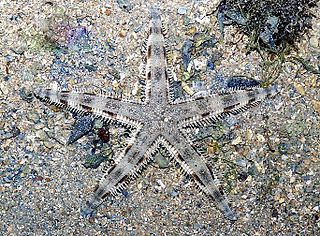
Archasteridae is a family of starfish found in shallow waters in the tropical Indo-Pacific region. The genus Astropus, previously included in this family, is now included in the genus Archaster with the single species, Astropus longipes, being accepted as Archaster lorioli Sukarno & Jangoux, 1977.

Fromia is a genus of starfish belonging to the family Goniasteridae.
Xyloplax turnerae is a sea daisy, a member of an unusual group of marine taxa belonging to the phylum Echinodermata. It has been found living on decaying timber in a deep oceanic trench in the Bahamas.
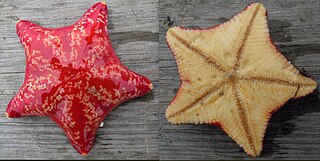
Poraniidae is a family of starfishes in the order Valvatida.

The Zoroasteridae are one of three families of Asteroidea in the order Forcipulatida. It contains seven living genera and one extinct genus.

Nepanthia is a genus of starfish of the family Asterinidae. Members of the genus have four to seven rays and are found in the eastern Pacific Ocean, ranging from Burma and Indonesia to Australia.

Circeaster is a genus of abyssal sea stars in the family Goniasteridae.
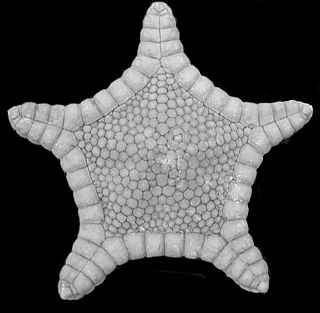
Astroceramus is a genus of abyssal sea stars in the family Goniasteridae.

Apollonaster is a genus of abyssal sea stars in the family Goniasteridae. They can be identified by their bare abactinal plate surfaces and multiple accessory granule rows on their abactinal plates. To date, Apollonaster has been found in the tropical Atlantic region and Hawaiian Islands region oceans, with no other locations or species being known as of 2015.

Thromidia catalai, sometimes called the heavy starfish, is a species of starfish in the family Mithrodiidae in the order Valvatida. It is native to the Indo-Pacific region. Thromidia catalai is one of the largest and heaviest starfishes in the world. It is reported to weigh as much as 6 kg (13 lb) and have a diameter of 60 to 65 cm. This species was first described by the Australian biologists E. C. Pope and F. W. E. Rowe in 1977, the type locality being New Caledonia.

Thromidia gigas is a species of starfish in the family Mithrodiidae. It was described by Ole Theodor Jensen Mortensen in 1935. It lives in the Indian Ocean off the coast of eastern South Africa and southern Madagascar. This species is probably the largest echinoderm in terms of bulk, and may exceed 13 pounds (5.9 kg).

















